Related Research Articles

Elizabeth Patterson Bonaparte was an American socialite. She was the daughter of a Baltimore merchant and the first wife of Jérôme Bonaparte, Napoleon's youngest brother.

Wrought iron is an iron alloy with a very low carbon content in contrast to that of cast iron. It is a semi-fused mass of iron with fibrous slag inclusions, which gives it a "grain" resembling wood that is visible when it is etched, rusted, or bent to the point of failure. Wrought iron is tough, malleable, ductile, corrosion resistant, and easily forge welded, but is more difficult to weld electrically.

Kingsville is a semi-rural, unincorporated community and census-designated place in Baltimore County, Maryland, United States. It is a close-knit and rustic community bounded by the Little Gunpowder Falls river and the Big Gunpowder Falls river which join to form the Gunpowder River. The population of Kingsville was 4,318 at the 2010 census.

Perry Hall is an unincorporated community and census-designated place in Baltimore County, Maryland, United States. The population was 28,474 at the 2010 census. It is a suburb of Baltimore.
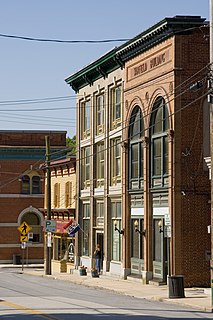
Sykesville is a small town in Carroll County, Maryland, United States. The town lies 20 miles (32 km) west of Baltimore and 40 miles (64 km) north of Washington D.C. The population was 4,436 at the 2010 census. BudgetTravel.com named Sykesville 'Coolest Small Town in America' in June 2016.

Joppatowne is a census-designated place in southwestern Harford County, Maryland, United States. Serving as a bedroom community for nearby Baltimore, it was established in 1961 as a planned unit development (PUD). The population was 12,616 at the 2010 census, up from 11,391 in 2000.

Elkridge is an unincorporated community and census-designated place (CDP) in Howard County, Maryland, United States. The population was 15,593 at the 2010 census. Founded early in the 18th century, Elkridge is adjacent to two other counties, Anne Arundel and Baltimore.

An ironworks or iron works is an industrial plant where iron is smelted and where heavy iron and steel products are made. The term is both singular and plural, i.e. the singular of ironworks is ironworks.
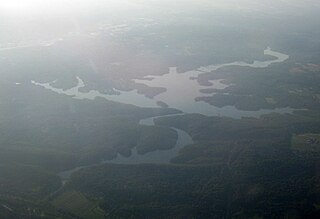
The Gunpowder River is a 6.8-mile-long (10.9 km) tidal inlet on the western side of Chesapeake Bay in Maryland, United States. It is formed by the joining of two freshwater rivers, Gunpowder Falls and Little Gunpowder Falls.

In American Colonial history, the Iron Act, also called the Importation, etc. Act 1750, was one of the legislative measures introduced by the British Parliament, within its system of Trade and Navigation Acts. The Act sought to increase the importation of pig and bar iron from its American colonies and to prevent the building of iron-related production facilities within these colonies, particularly in North America where these raw materials were identified. The dual purpose of the act was to increase manufacturing capacity within Great Britain itself, and to limit potential competition from the colonies possessing the raw materials.
Ruxton and Riderwood are unincorporated communities in Baltimore County, Maryland, United States. They are sometimes considered a part of Towson and are part of Towson's census area.
Joppa is a former colonial town and current planning region of Harford County, Maryland, United States. Joppa was founded as a British settlement on the Gunpowder River in 1707 and designated as the third county seat of Baltimore County in 1712. The original boundaries of Baltimore County were defined in 1659 and contained all of modern day Baltimore County, Baltimore City, Harford and Cecil counties and parts of Howard, Carroll, Anne Arundel and Kent counties. The settlement was named for the Biblical town of Jaffa in the ancient Holy Land of modern-day Israel. Joppa's harbor began to silt in due to clearcutting and farming upriver and coupled with multiple outbreaks of diseases such as smallpox and malaria, the county seat was moved to the growing, deep water port of Baltimore in 1768. Joppa's population would decline rapidly thereafter and businesses left for more prosperous environments in the new Baltimore Town.

Col. Charles Ridgely II, "Charles The Merchant" (1702–1772), of "Ridgely's Whim", was a Justice, planter, merchant, ironmaster, and member of the General Assembly of Maryland's lower chamber, House of Delegates and one of Baltimore County's commissioners. Charles II was the son of Charles Ridgely I,, , and Deborah Dorsey.

Principio Furnace and village is in Cecil County, Maryland, 4 miles (6.4 km) northeast of Havre de Grace, MD.
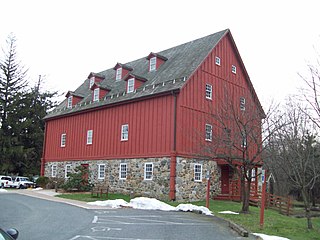
Gunpowder Falls State Park is a public recreation area comprising six non-contiguous areas covering 18,000 acres (7,300 ha) in northeastern Baltimore County and western Harford County, Maryland. The state park is primarily made up of the stream valleys of the Big and Little Gunpowder Falls and the Gunpowder River; its natural features range from tidal marshes to rugged interior slopes. The park has over 120 miles of trails for hiking, biking, horseback riding, and cross-country skiing plus facilities for picnicking, tubing, canoeing and kayaking, tide-water fishing and crabbing, fly fishing, and hunting, among other activities. It is managed by the Maryland Department of Natural Resources.

The Elkridge Furnace Complex is a historic iron works located on approximately 16 acres (6.5 ha) at Elkridge, Howard County, Maryland.
Members of the Whitaker family and related families were important in the iron and steel business in America during much of the 19th and 20th centuries.
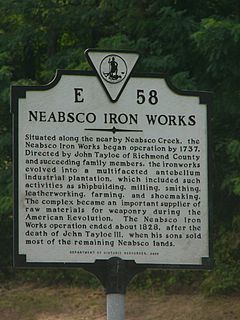
The Neabsco Iron Works was located in Woodbridge, Virginia, US. It was situated on 5,000 acres (2,000 ha) by the Neabsco Creek.
The Patuxent Iron Works was an ironworks along the Patuxent River in Maryland, United States.
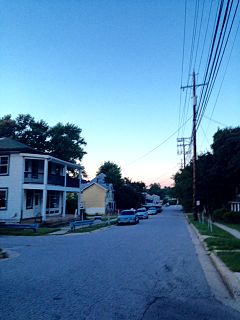
Elkridge Landing was a Patapsco River seaport in Maryland, and is now part of Elkridge, Maryland. The historic Elkridge Furnace Inn site resides within the Patapsco Valley State Park.
References
- ↑ McGrain, John W. "From Pig Iron to Cotton Duck", p. 212.
- ↑ Scharf, John Thomas (1881). History of Baltimore City and County, from the Earliest Period to the Present Day: Including Biographical Sketches of Their Representative Men. L.H. Everts. pp. 925.
- McGrain, John W. (1985) "From Pig Iron to Cotton Duck, Volume 1." Towson, MD: Baltimore Co., pages 212-214.